PM Lee Hsien Loong at May Day Rally 2014
SM Lee Hsien Loong
Education
Jobs and productivity
Social safety nets
1 May 2014
PM Lee Hsien Loong delivered his 2014 May Day Rally speech at the Devan Nair Institute for Employment and Employability on 1 May 2014.
This article has been migrated from an earlier version of the site and may display formatting inconsistencies.
Friends, brothers and sisters, Happy May Day to all of you!
We have had a good year last year. The economy grew 4.1 percent - faster than we had expected. Wages went up broadly and especially for the lower income and we have been upgrading our environment, improving Singapore, beautifying heartland estates like Jurong where we now are. This is a picture of Jurong as it is with new buildings to come.
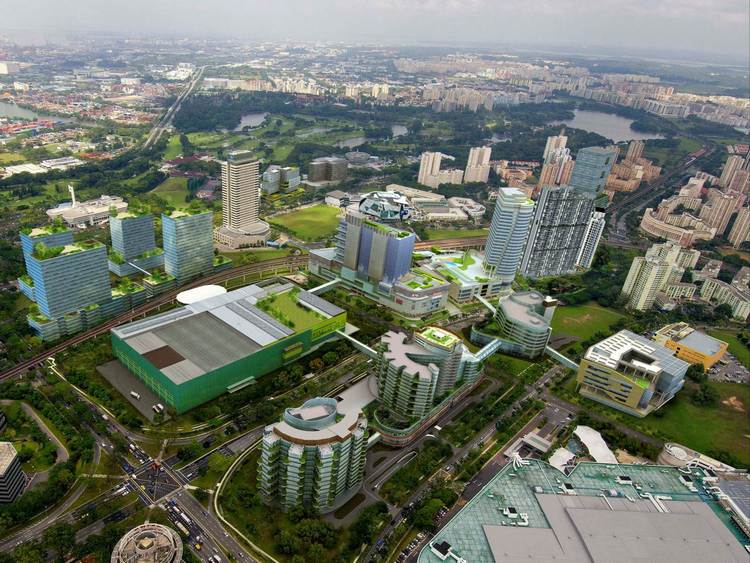
You can see the Devan Nair Institute which is a brown building on the right hand side. Opposite it, the big green one, you can see it coming up now is the Ng Teng Fong Hospital - will be open by the end of this year. This is Jurong, but we are also building things elsewhere in Singapore - community facilities like the Sports Hub. It should look like this by the middle of the year.

Lawrence Wong says it will be alright. We are building the National Gallery, will take a bit longer but 2015 National Day Parade, we are going to hold it there. We are strengthening our social safety nets to give Singaporeans a sense of security and peace of mind especially when it comes to housing, healthcare, education.
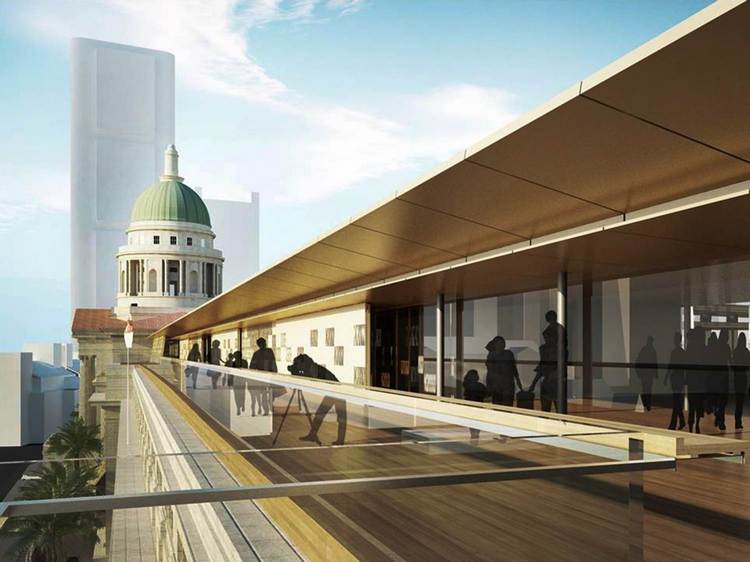
So I thank all the workers for working hard on this May Day. Singapore works because you do and we will help every worker to achieve your best, and climb higher peaks. And we will also make sure we have a good Singapore system, so that it can make each person’s effort count for more and our whole amount to more than the sum of our parts. When you work in Singapore, what you do is twice as effective, twice as valuable and twice as rewarding. One multiplier which enables us to work like this is tripartism, which we have painstakingly done over many years and is very difficult for any other country to duplicate. I would like to thank the generations of union leaders and union members who have contributed to today’s success.
One special group of unionists is the Pioneer Generation - the first generation of leaders in the 1950s, 60s, 70s who defeated the pro-communists in Singapore Association of Trade Unions (SATU). The young ones among you may not remember but SATU means the Singapore Association of Trade Unions. They were the pro-communist group. In the National Trades Union Congress (NTUC), the non-communist leaders fought them to win the hearts and minds of the workers and the confidence of the workers and the trust of the workers to assume NTUC’s leadership role today. Nobody appointed the NTUC. They fought for this right to represent Singapore workers and they won it. These Pioneer Generation unionists convinced workers to abandon the old model of lose-lose confrontation – strikes, protests, sit-ins, riots, turbulence – to give that up, embrace a new model of tripartite labour relations, win-win cooperation. They rallied support for us to open up our economy to foreign investments and to create good jobs for workers and they worked with the political leaders to set Singapore on the path to development and to change the lives of workers for the better permanently.
Many of these were not just unionists but Members of Parliament (MPs) and national leaders too, like Devan Nair, Mahmud Awang, Ho See Beng, P Govindasamy and many others. Some have already passed on. I am glad that several of our pioneers are here today. I see brother Tan Soon Yam who was a founding member of the Food Drinks and Allied Workers Union (FDAWU) and helped to manage the retrenchments at the Navy, Air and Armed Forces lnstitutes (NAAFI) stores when British forces withdrew in 1967. I think many of you may not know what NAAFI stores are - Navy, Air and Armed Forces Institutes. They used to provide goods, retail products, cinemas to the British servicemen when they were in Singapore. Big employer, so when the British left, these people were left with no jobs and we had to find new jobs for them and leaders like Soon Yam helped to take care of them, reassure them and find them new ways to make a living. He also fought politically because he persuaded hotel workers from the pro-communist union to leave the pro-communist union, join the FDAWU and made FDAWU dominant to represent almost all the gazetted hotels in Singapore.
Oscar Oliveiro, Union of Telecom Employees (UTES). When SATU broke off from NTUC, he actively lobbied unions to leave SATU, join NTUC. This was early 1960s. In the late 1960s after we become independent, we passed the Employment Act. He persuaded workers to support the Act and to understand that this was going to help Singapore attract investments and therefore help workers to get good jobs. For many years he was President of NTUC - starting in 1985 in the middle of a deep recession and working with the Government, helping the economy to recover and enter a decade of growth and prosperity.
Abdul Rahman Mahbob, Union of Power and Gas Employees Union (UPAGE) today, previously was the Public Utilities Board (PUB) staff union. He rose from shop steward in the City Council Staff Union to be the founding President of UPAGE and rallied workers to support the corporatization of PUB’s electricity and gas departments. My script says (the corporatisation started in) 1995. Actually we started in 1995 and for 10 years we were still working at this project because it was a very complicated project, very unsettling for workers, a lot of difficult decisions to be made, some retrenchments, many restructurings and he offered valuable advice and support during this long process with his colleagues in UPAGE, including the late brother Nithianandan and today we have a good healthy electricity industry, a reliable electricity supply, affordable prices and good jobs for the workers in UPAGE.
Mr Edwin Netto, Singapore Teachers’ Union. He retrained white collar workers from the British bases when the British left to take on blue collar jobs in Jurong - foremen, supervisors. He trained the union leaders in NTUC and when there were disputes he helped the unions prepare cases for arbitration. These are the Pioneer Generation union leaders and their stories which we should honour and respect especially on May Day. We salute you!
I worked with some of them for many years until they retired. Our first battle together was in 1985 in the middle of this deep recession when the economy went into a nose dive. I happened to be chairing the Economic Committee and it was my job to recommend to the Cabinet to cut Central Provident Fund (CPF) contribution rates to reduce cost and restore competitiveness - a very difficult and painful exercise but these leaders helped convince the workers it was necessary. They partnered the Government to revive our economy and to lead us out of the recession. So they have more than earned their place amongst the pioneers. And I am especially grateful to them because they have groomed a new generation of leaders to continue their good work and that is what we should do and continue to do and I think that is why we are honouring the pioneer unionists with other members of the Pioneer Generation through the Pioneer Generation package which will help lighten their medical burdens and especially also lighten the burden on their children - people my age and a bit younger, many of whom are here today. And that is why NTUC is organizing events to honour all the pioneers this year.
Singapore works because you do and we will help every worker to achieve your best, and climb higher peaks.
PM Lee
Singapore is at a turning point. Our economy is undergoing a major transition, so is our society. If you compare to any other country in the world, I think we are doing well but we are going through changes, difficult ones and it has brought stresses and strains, competition, anxiety, widening income distributions, worries over cost of living. Last week, I met union leaders for lunch and they said the economy was doing well, they appreciated policies to improve workers’ lives like the Pioneer Generation package, like Workfare but they could also see some worries ahead, especially for the more vulnerable workers - the lower wage ones whose incomes they would like to see grow faster and the older ones concerned about living expenses in their old age, healthcare but also other living expenses. And we have been working hard, not just in the last two years but over the last decade and longer as these problems came up on the horizon as we could see the issues which we were going to have. We have been working to address workers’ concerns and improve everyone’s life. So ComCare, Workfare, Productivity Scheme, all these are new current buzzwords but in fact these are things we have been doing for a decade and longer.
We have been keeping our economy competitive so that it can offer new and exciting jobs. We have been upgrading our workers through CET to take on better jobs at higher pay. We have been strengthening social safety nets to help vulnerable groups, for examples with the Additional Housing Grants, through Medifund Silver, Workfare. And this is how we have come through crisis successfully and strengthened our position in the world. And this is what we must do together to improve all our lives.
But what more must we do? Swee Say talks about cheaper, better, faster. I think we can also say better, better, better. Better workers, better jobs, better lives.
Let us start with better workers. We have one of the best workforces in the world. Business Environment Risk Intelligence (BERI) puts us number one - has done so for many years now for quality of workforce, and companies also have that assessment. So I meet Rolls Royce which has a very good operation here in the Seletar Aviation Park. And they tell me that the workers in Singapore are as productive as their workers back in Derby in England. We have trained there, we have worked with them, they know our quality and we know their quality.
So we have a good workers, we have a good workforce but no lead is permanent and the competition is relentless. In other countries, the workers are also trying to be cheaper, better and faster. And it is not just in the poor developing economies but even the mature developed ones too. And we have to know that and we have to be conscious of it and respond to it. I talked to one Port of Singapore Authority (PSA) Union leader, and he said it is very hard to get Singaporeans to operate cranes. So I was very happy to see we have a crane operator just now, it is as exciting as driving a racing car. But we should get more Singaporeans to feel like that because many Singaporeans do not like to drive cranes or port vehicles because they have to work spilt shifts and it is hard work and you may have to be in the hot sun.
So this Unionist visited Hong Kong’s port recently – Hutch. He found there the workers, Hongkongers, working spilt shifts, going for training in their own time, (using their) own money to upgrade themselves. I said “Are they Hongkongers?” He said “Yes.” I said “Why are they doing this?” He said he asked the same question. And the answer? Because the Hong Kong workers can see millions of other workers nearby, ready to take their job. So if they do not do this, somebody else will do this. They do not have to come to Hong Kong, they set up in Shekou – it is close enough. They are in Shanghai - it is big enough. They are in Hong Kong - they have to work hard enough. In fact if you are in Singapore, we also have to work quite hard. So our workforce is better, our overall system is better but the gap is not huge, the gap closes and we must maintain our lead - to be hardworking, adaptable, ready to fight for our livelihoods, and outsmart and outthink our competitors.
Technology is fundamentally changing every facet of our lives. It is transforming industries and companies. Robots are replacing not just line workers but professionals – radiologists, accountants, all sorts of jobs. Just now upstairs we had a demonstration – grass cutting. You do not go and swing a knife, you play with a joystick and the robot will cut the grass for you. And this is not in future, this is now, so all jobs are going to be changed. People talk about contract manufacturing, you make hand phones, you make disk drives. But now, you can almost make these things using 3D printing. I do not think it can make a hand phone yet, but people can print handguns using 3D printing and it can shoot - real bullets, not dummies. We have shops, retail business but online shopping is taking over brick and mortar retailers. We have taxis, good service by taxi drivers but there is also competition from Lyft, from Uber, from apps.
Technology is changing all our jobs and these changes are going to happen whether we like it or not. And we cannot stop this change, we cannot escape this change. The only way is to know which way the world is going, use this to our advantage and get there where we need to be, faster than our competitors and that is what the Government is trying to do.
So pre-employment schools, education, we are investing heavily to produce well-trained workers - whether it is ITEs, whether it is the Polytechnics, whether it is Universities, whether it is the schools. Every one of our institutions has to be outstanding. We are raising this not just for schools but actually to go beyond that. So we have a committee called the Applied Study in Polytechnics and ITE Review (ASPIRE) Committee which Indranee is chairing and the ASPIRE committee’s job is to see how we can develop more pathways for people whichever way they go in our school system - to be able to have more doors open, more opportunities, more possibilities and you will never say “I did badly in one exam, my life is finished.” There is always another chance, work hard. So pre-employment, we have to upgrade our workers.
Re-employment, we have to help the older workers continue working as long as they can even beyond 65. And I talked about this just now in my Chinese speech, I think you have got my message and I do not need to repeat what I said. But we are fully supporting on-going tripartite discussions to extend the re-employment age beyond 65 and we will get there.
During employment, we are focusing on promoting CET for people already working. And knowledge is becoming obsolete more quickly, it is critical that you keep on updating yourself and reloading firmware. When you have an iPhone, the apps every few days, new updates, new upgrades, old bugs fixed, new capabilities, better have the latest one. When you are a worker, we better have the latest firmware in our brains also. You have the wrong firmware and it has a bug inside it, we have a problem. So we have to upgrade this and continue to upgrade this and we have been working on this for some time with good results. But we were confident we could do even better, putting together e2i in two good campuses - with training providers, career counsellors, classrooms under one roof. Then the workers can find the relevant trainer, the trainers can work with the workers, develop relevant courses and we can do job matching career development services and workers can get advice on managing their careers. And that is why, although CET has been operating now for, I think, 10 years, we have decided to build these two campuses – the East campus operated by Workforce Development Agency (WDA) and the West campus operated by e2i. And the Government is funding these two campuses, we are paying for it $300 million. But I think it is money well-spent.
So that is why today I am very happy before coming in for this rally. Upstairs we launched this Devan Nair Institute for Employment and Employability.
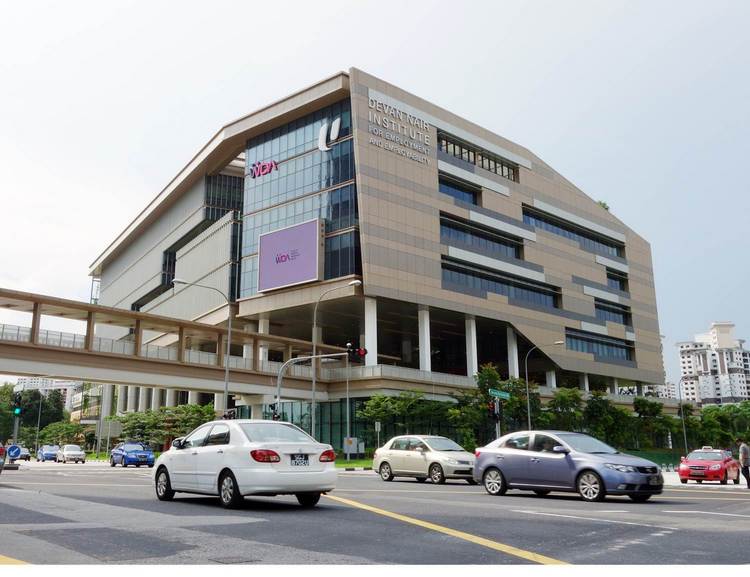
It looks a handsome building. But it is not just a building; it is what is inside it – offering services catering to different skills and workers. I had a mini tour around earlier. I was very impressed with the facilities, with the courses being offered, with the passion of the e2i staff and also with the confidence and the success of the graduates of e2i - people who have come, people who have taken the courses, gone on, found new jobs, got better pay and come back to tell their stories.
It is fitting that this institute is named after Mr Devan Nair. He was one of our pioneer union leaders who built up the non-communist union movement, served as Sec-Gen for many years and was pivotal in forging a united and forward-looking labour movement.
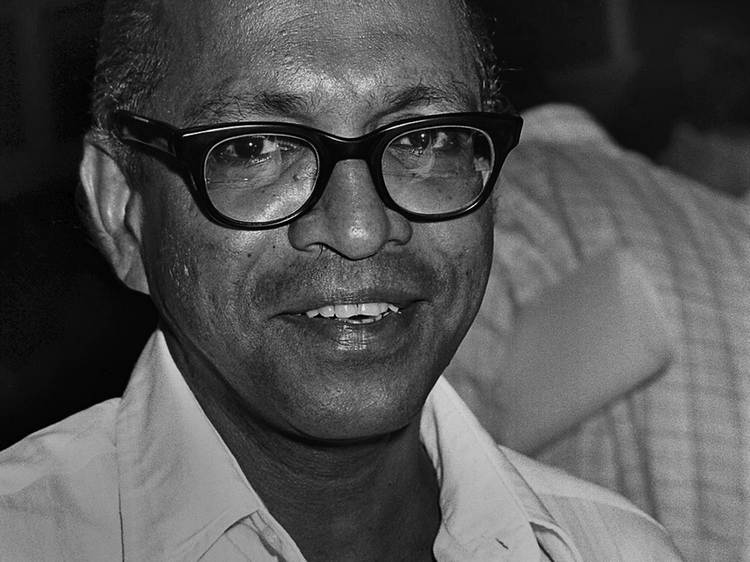
This institute is a good way to honour Mr Nair’s spirit and contributions as a teacher and a unionist. He started life as a teacher. He became a unionist and as a unionist, his passion as a teacher continued and I am very happy that his son, Janadas, and his daughter in law, Geraldine, are here today.
We have another CET institute coming up in Paya Lebar- the Lifelong Learning Institute which will be opening later this year. (Pointing to picture) This is the Lifelong Learning Institute.
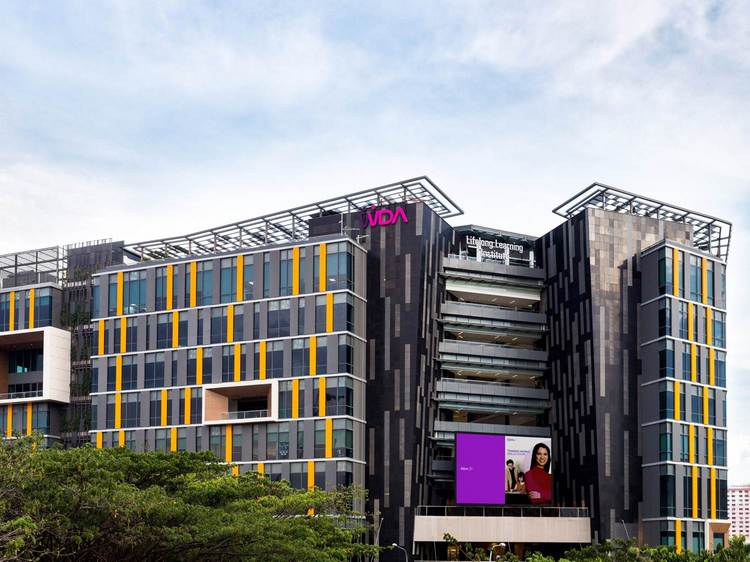
We can stay abreast of what is happening in the world, we can be up there as good as anybody else.
PM Lee
You will not imagine that it is a workers’ training institute but that is what we mean when we say every institute is a good institute. These two institutes reflect our commitment to investing in our workers, help you to improve your skills and stay employable, so I strongly encourage you, take full advantage of these facilities, these services, go. I asked one lady just now, “Why did you come for the course?” She said, “She was working, she wanted to upgrade herself, the union recommended her, she came.” I said, “Did you pay?” She said, “No, this course was free.” Couple of days, she gained confidence, she has found a better job. I spoke to her and I would have hired her too. So I think we should encourage Gilbert who runs e2i to do a good job and produce many more graduates like that. Where is Gilbert? (Applause)
We cannot tell our competition to go away. They want to eat our lunch, we know that. They want to eat our dinner, we suspect that. We cannot stop them from wanting but we can make sure that we can hold our own and we will eat our own lunch and we can provide you the resources and the means to stay one step ahead of the competition and we will have a Singapore system which we can work together to build, to maximise your potential, maximise your contributions. If you apply yourself and make the effort, you will succeed and so will Singapore.
Developing better workers is one way to create better lives but the second way is to create better jobs – to raise the value of your work, the dignity of your work and work is better than any social safety net we can craft and it is better than any social transfer that we can arrange. We will have social safety nets. We do have social transfers. We have Workfare; we have unemployment arrangements, benefits through the unions, through the workers. We have Medishield Life coming but the best thing is you have a job; you have assurance for the future.
That means we have got to keep our economy strong, open, developing better companies, staying connected to the world. It is how we have become a successful city, it is how we have maintained ourselves, cosmopolitan, welcoming, having a hinterland wider than our physical borders. If we were confined just to the island of Singapore, I think we would be a tiny country. But our hinterland is Southeast Asia, it is Asia, we do business with the world. We are still a small country but our ambitions do not have to be small. We can stay abreast of what is happening in the world, we can be up there as good as anybody else.
Therefore we work closely with our neighbours on win-win projects - Iskandar Malaysia growing, we are discussing with Prime Minister Najib how we can do more in Iskandar Malaysia. In Vietnam we have the Vietnam-Singapore Industrial Park (VSIP), thriving. First one was near Ho Chi Minh City, now the last trip I was in Vietnam, I broke ground for the fifth Vietnam-Singapore Industrial Park which is in Quang Ngai province, somewhere in the middle of Vietnam, not so well known but we hope in time it will be successful. And this will be a network for us to generate prosperity and success within Singapore for our people. At the same time we support free trade and investments - the Trans-Pacific Partnership which we have been negotiating with America, with Japan, with Australia, with Malaysia and so on. We have an EU-Singapore Free Trade Agreement almost done, which will expand our export markets and attract more investments here.
We want a strong economy in order for us to have good lives for our people, welcoming talent to live, work or play here and acknowledging that staying open brings us stresses and strains. We have to manage all these problems which come and slowing down foreign worker inflow, introducing the Fair Consideration Framework. But we must not send the wrong signal that Singapore does not welcome investments or that we are turning away talent.
We want to do well; we are doing well for our people. The best way to do that is by being open, big hearted, and confident. We compete, we can win. We are not afraid. So that is what we must do, that is what we have to do together and I hope you will understand this and help us to keep Singapore a good and productive place for business.
We are attracting good investments to Singapore. They are different from the source we used to get before but good investments – higher-skilled, knowledge-intensive, innovation driven. I go to these new projects from time to time when I can and last year I went to one interesting one, Lucasfilm. This is not a scene from Star Wars. It looks like a Sandcrawler and it is called a Sandcrawler but it is actually Lucasfilm’s office in Singapore at Buona Vista, One North.
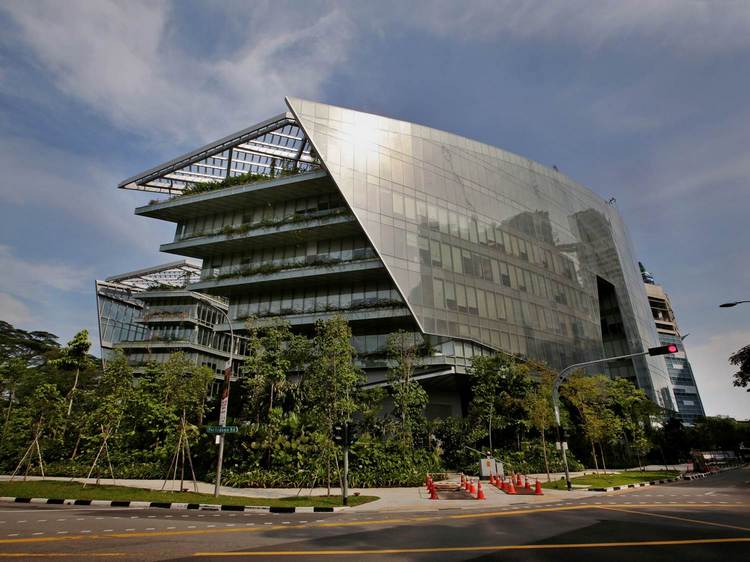
Lucasfilm produces not just Star Wars movies but also many other movies now using digital animation and special effects. They could have put this building anywhere in the world because you just have a broadband fibre, you connect to San Francisco and you can do business. But they chose Singapore because we have an international talent base, because we have good infrastructure, because we have creative minds with the right skills to create amazing special effects. I visited them at the Sandcrawler in January and I met some of the people - many Singaporeans as well as artistes, animators, special effects experts from all over the world and this is the team.
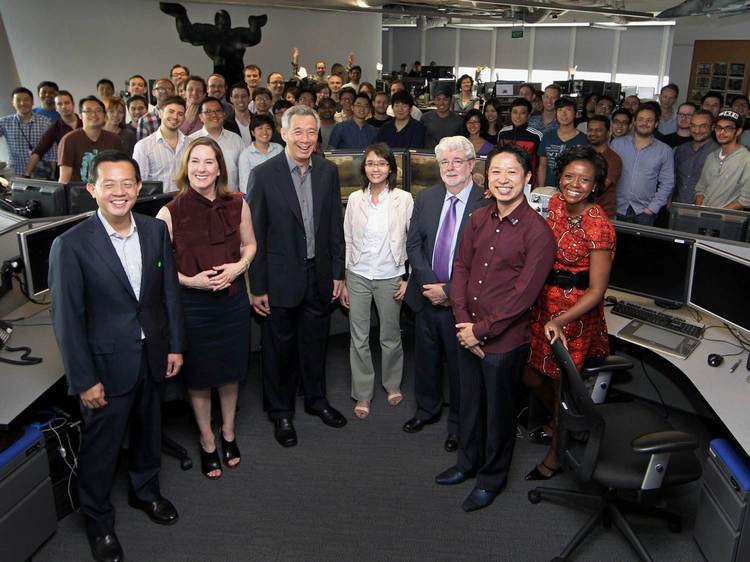
I told them you should do a special effect on this team. I did not bring it to you but they sent it to me and the special effect showed the front row still there, and behind a huge wave was coming to meet us, from their next movie. It is fascinating work and they were all excited to be there. So we also must upgrade ourselves in order to be up there with those companies and to get those jobs.
Our local companies also must upgrade themselves to be there. We are helping them to raise their productivity. They have been doing so for some time and there are many schemes available. There are so many acronyms that we lose count - PIC, Productivity and Innovation Credit, Capability Development Grant, tax incentives, Inclusive Growth Program - you name it, we have it. The schemes are there, the effects are there. When I went around upstairs, they showed me some of the ways you have been using the schemes. Instead of having the expert stir the kuay teow, you have a machine spin and spin and spin and there is paddle inside which stirs the kuay teow around. When it is ready, the kuay teow pours out by itself. You just have to sit there and eat it. There are many other gadgets, devices and techniques in order to upgrade the ways SMEs can operate in order to make them more productive, more profitable so they can offer better jobs for their workers. I think the SMEs understand this. They are beginning to take full advantage of this and we will continue to support them to the maximum in order to be able to succeed in this very difficult job. I know they have a tough job, you know they have a tough job, your employees in them realise how difficult it is but we will be able to help many of them to succeed together. But the companies must do your part too.
On May Day, I think the message is not just for workers but also for companies. Take advantage of these programs, make the effort to upgrade. Your workers will make the effort; you also must make the effort - value your workers, invest in them for the long term, upgrade their jobs, and create a future for them. They are your partners, not just your employees. Share the fruits of the success with them, with the community and strengthen the society we all belong to.
Many companies have done this. One example is Fong Shen Mould and Precision Engineering which produces moulds for making consumer goods, handphones, computer casings. They decided to automate their production to lower costs and we subsidised them with our schemes and it has worked. So what they do is, when making the moulds and components, the tooling is now done by a robot. So you see the person controlling the robot using the remote control and the robot picks the right cutting tools to design the mould according to specs and the robot moves faster than a human being, it makes fewer mistakes and the tool room needs less manpower.
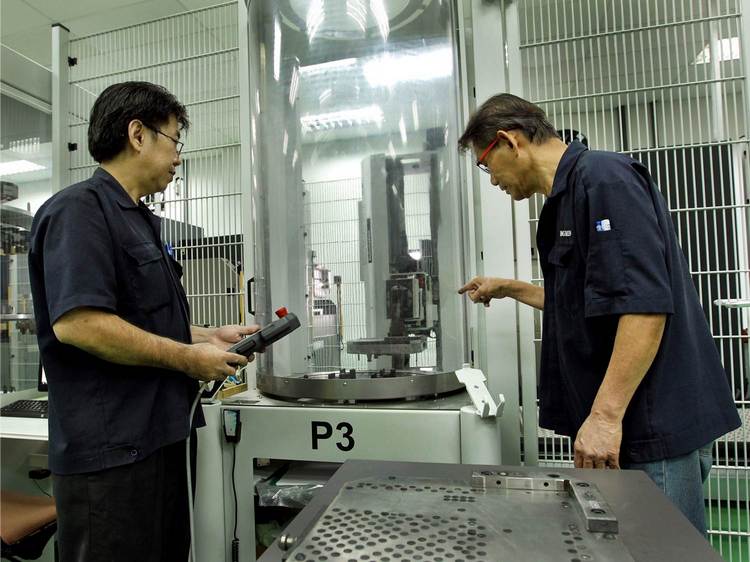
And so as a result, the company can take on more complex jobs which pay better and make moulds not just for simple things, but even moulds for contact lenses, products for aerospace, for medical technology. I think what you will be most interested to know, workers enjoy better hours and more exciting opportunities.
So with better workers and better jobs, I think we can enjoy better lives and higher incomes and living standards and an upgraded living environment - whether in Jurong East, whether in Paya Lebar - and good public services, education, healthcare, transport, and stronger social safety nets. So my Government is going to do all we can to improve Singaporeans’ lives. It is what drove our predecessors to fight for Singapore, to fight the communists, to work, to build Singapore up with the Pioneer Generation. It is why we will continue to invest in our future and create a tomorrow that is better than today.
And the unions, you are in the middle of this. Fighting for the interests of workers, persuading them to support policies and embrace change which will benefit you and working with the Government and employers to take Singapore forward. So we have to strengthen the unions to play this role. We have 800,000 members now, the profile is changing. One third are PMEs; 10 per cent are students today and workers of tomorrow. Some of them were performing on stage just now. And it is a workforce which is changing very rapidly. Today, already 30 per cent are going to our state universities but if you count other universities, other pathways, half of our students get some kind of university degree. More and more of our people will be PMEs. By 2030, two-thirds will be PMEs. So there will be more PMEs than there will be rank and file or blue-collar workers. And there will be more older workers. So you have got to respond to these changes to understand the PMEs’ needs, represent the PMEs, help the older workers to adjust, and build trust with the new generation.
The Government will continue to help the unions to do this – keeping our legislation up to date, like the Employment Act, the Industrial Relations Act, the Retirement and Re-employment Act and encouraging employers to partner unions every step of the way. But unions must also renew yourselves. And this is an area where we can learn from the pioneers. They were passionate leaders, they served a long time and at the same time they groomed their successors well and carried out smooth and timely leadership transitions. So today we have capable leaders taking the unions forward but it carries on and we have to keep on with this renewal and I am glad to see that many union leaders are making way for new blood at 62 - retaining their links as advisors, as mentors, as emeritus presidents. I think these are ways we can renew ourselves and keep on tapping on the wisdom of the older generation. That is why today we have got a good young team in charge. NTUC has four new ASGs – Patrick Tay, Yeo Guat Kwang, Ang Hin Kee, Zainal Sapari. They are young but they have proved themselves, they are passionate about their roles. Please give them your support. And I should mention two more, Cham Hui Fong and Heng Chee How as well, not new but still quite youngo we are small in size but we are strong in unity. We are not perfect but we are doing our best and doing better than most. So as we celebrate May Day, let us count our blessings and show our appreciation to one another – employers, workers, Government, Singaporeans. Let us commit ourselves to strive better, to do better as an economy, as a society and a nation. This is the way to a better future, for better workers, better jobs, and better lives.
Happy May Day! Thank you!
Explore related topics
